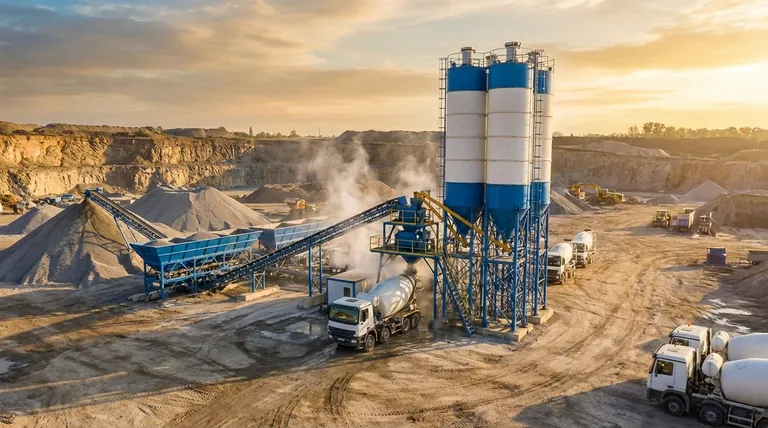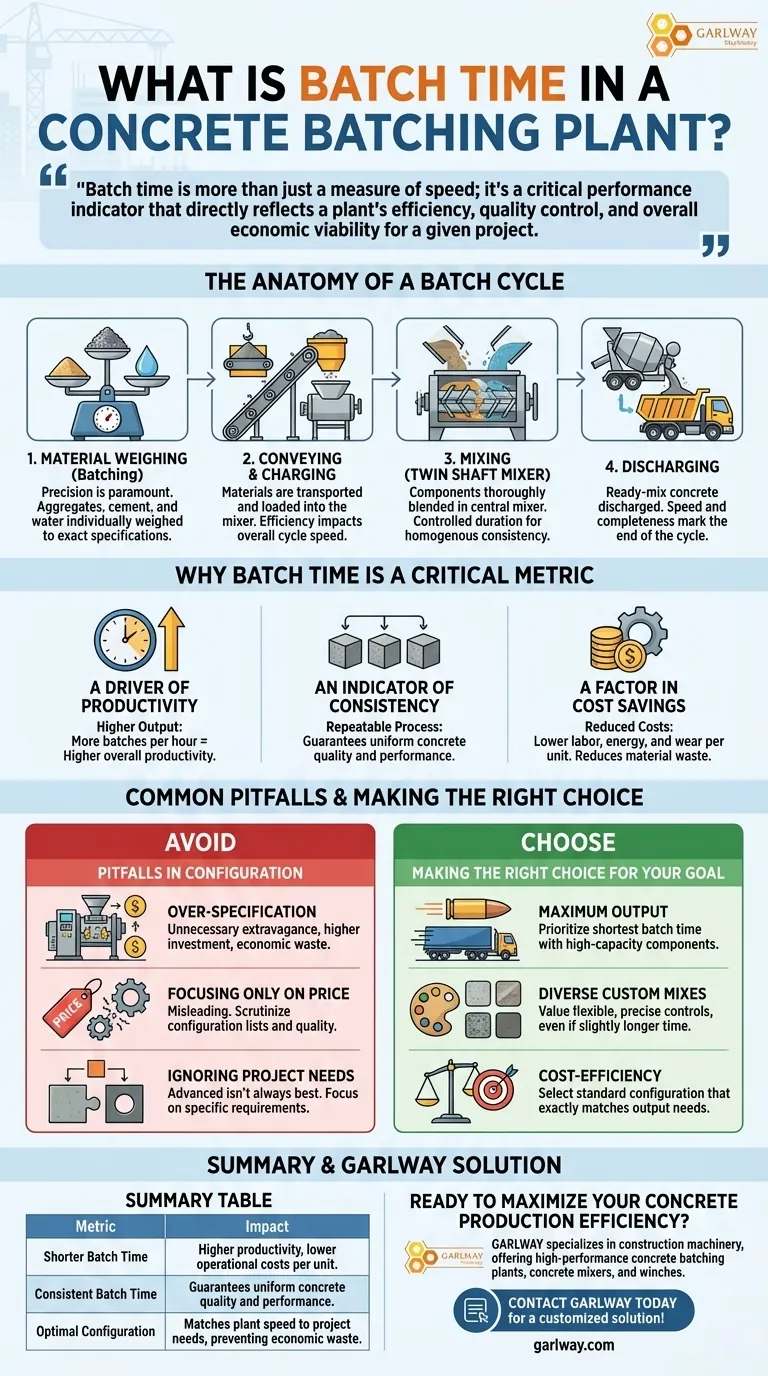In a concrete batching plant, batch time is the total duration required to complete one full cycle of concrete production. It begins with the initial weighing of raw materials like aggregates and cement and concludes with the final discharge of the finished, ready-mix concrete from the mixer. This systematic process is the fundamental unit of a plant's productivity.
Batch time is more than just a measure of speed; it's a critical performance indicator that directly reflects a plant's efficiency, quality control, and overall economic viability for a given project.

The Anatomy of a Batch Cycle
To truly understand batch time, you must understand the distinct, sequential stages that comprise a single cycle. Each step contributes to the total duration and has a direct impact on the quality of the final product.
Step 1: Material Weighing (Batching)
This is the foundational step where precision is paramount. Aggregates (sand, gravel), cement, and water are individually weighed to exact specifications for the mix design. Any delay or inaccuracy here compromises the entire batch.
Step 2: Conveying and Charging
Once weighed, the materials are transported and loaded, or "charged," into the plant's mixer. The efficiency of conveyor belts, skip hoists, and gates directly impacts the overall speed of the cycle.
Step 3: Mixing
Inside a central mixer, often a twin shaft mixer, the components are thoroughly blended. The mixing duration is precisely controlled to ensure the concrete achieves a homogenous consistency and meets required strength standards.
Step 4: Discharging
After mixing is complete, the ready-mix concrete is discharged from the mixer into a transit truck or holding hopper. The speed and completeness of this discharge mark the end of one batch cycle, allowing the next to begin immediately.
Why Batch Time is a Critical Metric
Viewing batch time as a simple duration misses its significance. It is a key metric that informs operational efficiency, product quality, and financial outcomes.
A Driver of Productivity
A plant's output is measured in cubic meters or yards per hour. This figure is a direct function of its batch size and batch time. A shorter, more efficient batch time means more batches per hour and therefore higher overall productivity.
An Indicator of Consistency
A consistent and repeatable batch time is a hallmark of a well-run operation. It ensures that every batch undergoes the same process for the same duration, which is crucial for delivering concrete of consistent quality and performance.
A Factor in Cost Savings
Efficiency is directly tied to cost. Faster batch times mean reduced operational costs, including labor, energy consumption, and equipment wear per unit of concrete produced. This process also helps in reducing material waste.
Common Pitfalls in Configuration
When selecting a batching plant, focusing on batch time without considering the broader context can lead to costly mistakes. The goal is not always to have the fastest cycle, but the most appropriate one.
The Trap of Over-Specification
Choosing a plant with capabilities far beyond your project's needs is a common error. This "unnecessary extravagance" in speed or features results in a higher initial investment and operational costs, leading to economic waste.
Focusing Only on Price
Comparing plants based on price alone is misleading. It's critical to scrutinize the configuration lists from different manufacturers, paying close attention to the quality and origin of key accessories that impact performance and reliability.
Ignoring Specific Project Needs
The most advanced plant is not always the best choice. The most economical and effective option is the one that is configured to best fit and meet your specific needs, whether that involves producing standard mixes or highly customized ones.
Making the Right Choice for Your Goal
Your operational goals should dictate how you evaluate a plant's batch time and overall configuration.
- If your primary focus is maximum output for large-scale projects: Prioritize a plant optimized for the shortest possible batch time with robust, high-capacity components.
- If your primary focus is producing diverse, custom concrete mixes: Value a plant with flexible, precise batching controls and component variety, even if its absolute cycle time is slightly longer.
- If your primary focus is cost-efficiency for a specific scope: Select a standard configuration that precisely matches your output requirements without paying for excess speed or features you will not use.
Ultimately, understanding batch time empowers you to select a plant that serves as a strategic asset, not just a piece of equipment.
Summary Table:
| Metric | Impact |
|---|---|
| Shorter Batch Time | Higher productivity, lower operational costs per unit. |
| Consistent Batch Time | Guarantees uniform concrete quality and performance. |
| Optimal Configuration | Matches plant speed to project needs, preventing economic waste. |
Ready to maximize your concrete production efficiency?
GARLWAY specializes in construction machinery, offering high-performance concrete batching plants, concrete mixers, and winches tailored for construction companies and contractors globally. Our experts will help you select a plant with the ideal batch time for your specific project needs, ensuring maximum productivity and cost savings.
Contact GARLWAY today for a customized solution!
Visual Guide

Related Products
- HZS180 Ready Mix Concrete Plant for Foundations with Sand and Cement
- HZS75 Concrete Batching Plant Cement Mixer Price Concrete Mixer Bunnings Mixing Plant
- HZS120 Ready Mix Concrete Batching Plant Commercial Mud Cement Mixer
- HZS35 Small Cement Concrete Mixing Batch Plant
- Portable Concrete Mixer Machine Equipment for Mixing Concrete
People Also Ask
- What are the advantages of a concrete plant? Achieve Consistent Quality & Efficiency for Large-Scale Projects
- How to make ready mix concrete stronger? Boost Strength with Proven Mixing Techniques
- How does ready-mix work? A Guide to Efficient, High-Quality Concrete Delivery
- What are the different types of cement plants? A Guide to Wet Mix, Dry Mix, Stationary & Mobile Plants
- What are the advantages of concrete batching plant? Boost Quality & Efficiency for Your Project















